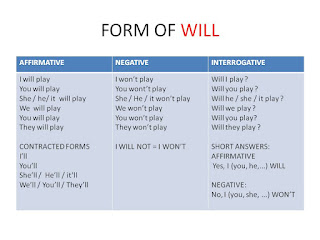FEBRUARY 2nd
FUTURE TENSE
In your notebook solve this parts of the workshop for today
1. Warming up.
Read this cartoon. What´s your opinion of the topic. Do you agree? Do you disagree?

2. Grammar.
Please read understand and copy in your notebook the aspects related to the grammar explanation and structures
3. Workshop
This will be the time for practice. Please go to this link, solve the activities # 1 - 21; and 23. Take note of your results in your own notebook.
MORE ACTIVITIES
READING COMPREHENSION ACTIVITY
The world in 2050
Lea, 25
I hope that the world countries will be able to overcome the different issues in 2050. We will live in peace and won’t have any wars anymore. We will be able to explore the space and to find other habitable planets. We will perhaps find other intelligent Beings on other planets in 2050.
About the reading
A. Answer these questions
1. Who of the three has an optimistic opinion of the future?
2. Which one has an adverse point of view?
3. Which one do you agree with?
C. Copy this chart in your notebook. Write only the key words/ expressions that summarize the information from each person. Follow the model.
A. Answer these questions
1. Who of the three has an optimistic opinion of the future?
2. Which one has an adverse point of view?
3. Which one do you agree with?
B. Look for the way to explain in English the words on blue, or look for a synonym that you could understand and memorize. Follow this model.
demographics: related to population statistics. How many people there are in a place.
What will the world look like in 2050? What do they think? Fill in the table!
People
|
Information
|
India first largest economy
problems: demographics, pollution, climate changing
9 billion people
spaceships travel to other planets
need more resources
| |
Your turn! What do you think? What will the world look like in 2050?
………………………………………………………………………………………………………………………………………………………………………………………………………………………………………………………………………………………………………………………………………………………………………………………………………………………………………………………………………………………………………………………………………………………………………………………………………………………………………………………
NOTEBOOK PRACTICE
Exercise 1. Go to this link. Solve in your notebook the exercises according to your teacher´s instructions.
Let´s practise in a different way...
Exercise 2. Listen to the song. Try to understand and complete the lyrics. The bald words could help you. If you need to listen more than once don´t worry. TRY TO LISTEN AND IDENTIFY THE MISSING WORDS.
Exercise 2. Listen to the song. Try to understand and complete the lyrics. The bald words could help you. If you need to listen more than once don´t worry. TRY TO LISTEN AND IDENTIFY THE MISSING WORDS.
strong - I won't give in - I will fight - I'll take - we'll make - I'll be - Nothing - will work
See the video again. Try to answer these questions in your notebook
1. The main characters of the video are a boy and a blond girl. What happens with them at school?
2. How do they meet each other? What do they have in common?
3. How do they become friends?
4. What kind of activities do they do together?
5. What happen with the girl at the end?
1. The main characters of the video are a boy and a blond girl. What happens with them at school?
2. How do they meet each other? What do they have in common?
3. How do they become friends?
4. What kind of activities do they do together?
5. What happen with the girl at the end?
LISTENING ACTIVITY N. 2
1. Could you identify the celebrities that are in this advertisement? Who are they? Do you know their names?
2. What are their jobs?
3. What is the name of the song?
2. What are their jobs?
3. What is the name of the song?
4. Who is the band that sing the original theme?
5. Look for the lyrics and practice by yourself
6. Present your song to the class
6. Present your song to the class
Listening activity N. 3
Copy these statements in your own notebook
1. I_____ ________ to you tomorrow.
2. Where ________ the meeting _________?
3. Who ________ _________ there?
4. She_______ ________ it later.
5. They_______ _________ all the way home.
6. We_______ _________ a good time.
7. ________ you ________ here tomorrow?
8. He________ __________ his homework tomorrow.
9. It_______ ________ until next week.
10. That________ _________ $21.89, please.
Go to this link. Listen and complete the sentences
above with future actions

















